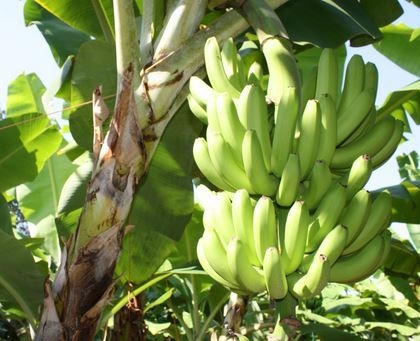Edible Banana
(Musa acuminata)
Edible Banana (Musa acuminata)
/
/

Arthur de Jesús Chavarría Pérez
CC BY 4.0
Image By:
Arthur de Jesús Chavarría Pérez
Recorded By:
Copyright:
CC BY 4.0
Copyright Notice:
Photo by: Arthur de Jesús Chavarría Pérez | License Type: CC BY 4.0 | License URL: http://creativecommons.org/licenses/by/4.0/ | Rights Holder: Arthur de Jesús Chavarría Pérez | Publisher: iNaturalist | Date Created: 2019-06-14T11:23:20-07:00 |






















































Estimated Native Range
Summary
Musa acuminata, commonly known as Edible Banana, is an evergreen perennial herb native to tropical rainforests of Southern Asia, including the Indian Subcontinent and Southeast Asia. It typically grows to a height of 10-20 feet (3-6 meters) with a false trunk, or pseudostem, formed by tightly packed leaf sheaths. The true stem is an underground corm from which new shoots emerge. The inflorescence, which grows horizontally or obliquely from the pseudostem, bears numerous flowers with white to yellowish-white petals. The fruit, technically a berry, is elongated and slender, with the number of seeds affecting its size. However, cultivated varieties are usually seedless.
The Edible Banana is cultivated for its fruit, which is a staple food crop in many parts of the world. It is also grown as an ornamental plant for its striking shape and large, attractive foliage. In cultivation, it requires a warm, frost-free climate and does best in full sun or partial shade. It prefers consistently moist, well-drained soil rich in organic matter. While it is generally easy to maintain, it can be susceptible to root rot if overwatered and may suffer from pests like nematodes, weevils, and borers. It is also prone to wind damage due to its large leaves. In non-tropical regions, it requires winter protection or greenhouse cultivation.CC BY-SA 4.0
The Edible Banana is cultivated for its fruit, which is a staple food crop in many parts of the world. It is also grown as an ornamental plant for its striking shape and large, attractive foliage. In cultivation, it requires a warm, frost-free climate and does best in full sun or partial shade. It prefers consistently moist, well-drained soil rich in organic matter. While it is generally easy to maintain, it can be susceptible to root rot if overwatered and may suffer from pests like nematodes, weevils, and borers. It is also prone to wind damage due to its large leaves. In non-tropical regions, it requires winter protection or greenhouse cultivation.CC BY-SA 4.0
Plant Description
- Plant Type: Herb
- Height: 12-20 feet
- Width: 6-10 feet
- Growth Rate: Rapid
- Flower Color: N/A
- Flowering Season: Spring, Summer, Fall
- Leaf Retention: Evergreen
Growth Requirements
- Sun: Full Sun, Part Shade
- Water: Medium
- Drainage: Slow, Medium, Fast
Common Uses
Bird Garden, Border Plant, Edible*Disclaimer: Easyscape's listed plant edibility is for informational use. Always verify the safety and proper identification of any plant before consumption., Potted Plant
Natural Habitat
Tropical rainforests of Southern Asia, including the Indian Subcontinent and Southeast Asia
Other Names
Common Names: Wild Banana, Cavendish Banana, Chinese Banana, Banana, Dwarf Banana, Zwergbanane, Banane, Plátano, Bananier, Bananier Nain
Scientific Names: , Musa acuminata, Musa cavendishii, Musa corniculata, Musa sinensis, Musa acuminata var. burmannicoides, Musa brieyi, Musa chinensis, Musa sapientum var. rio, Musa simiarum
GBIF Accepted Name: Musa acuminata Colla